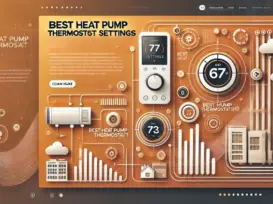Grus Home Energy - heat pump
How Heat Pumps Work: Efficient Heating and Cooling for Your Home
Heat pumps are an efficient and cost-effective way to keep your home comfortable year-round. These systems work by transferring heat from one place to another, rather than generating it through combustion like traditional furnaces. In the winter, heat pumps extract heat from the outside air (even in cold temperatures) and transfer it inside to warm your home. In the summer, the process is reversed to cool your home by removing heat and humidity from the indoor air and releasing it outside.
One of the main benefits of heat pumps is their energy efficiency. Since they only move heat rather than creating it, they can provide the same amount of heating or cooling using significantly less energy than traditional HVAC systems. This can result in lower utility bills and reduce your carbon footprint. In fact, some heat pumps can be up to 50% more efficient than electric resistance heating.
There are three main types of heat pumps: air source, ground source (geothermal), and water source. Air source heat pumps are the most common and are typically the most affordable to install. They work by extracting heat from the outside air and transferring it indoors. Ground source heat pumps, also known as geothermal heat pumps, use the stable temperature of the earth to heat and cool your home. While they are more expensive to install, they are highly efficient and can save you money in the long run. Water source heat pumps utilize a body of water, such as a pond or lake, to transfer heat.
Heat pumps also have the added benefit of dehumidifying the air in your home, which can improve indoor air quality and make your home more comfortable. Additionally, many heat pumps have the ability to be reversed, allowing them to provide both heating and cooling functions in one system.
When considering a heat pump for your home, it is important to work with a qualified HVAC professional to determine the right size and type of system for your specific needs. Proper installation and maintenance are key to ensuring your heat pump operates efficiently and effectively for years to come.
In conclusion, heat pumps are a versatile and energy-efficient option for heating and cooling your home. By leveraging the heat transfer process, these systems can provide consistent comfort while reducing energy consumption and lowering your utility bills. Consider investing in a heat pump for your home to experience the benefits of efficient and sustainable heating and cooling.
Blog, Energy Savings & Cost Reduction , July 7, 2024 , 26°C, Energy Efficiency, heat pump, smart home control, smart thermostat, thermostat settings
©2025 All Rights Reserved. Grus IoT Co.,Ltd.
